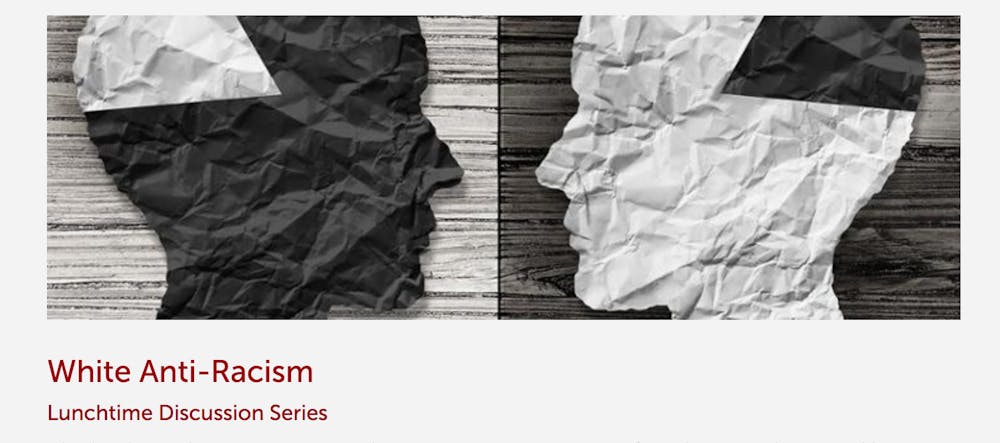A University of Richmond white anti-racism group has found even more urgency in its mission following the news of racist incidents on campus.
The group, which has met on campus since September 2019, has recently discussed the racist comments on dorm room doors and, earlier in the academic year, the Westham burial ground site, said Glyn Hughes, the director of the Office of Common Ground.
“I hate that these events happened,” said Lindsey Paul, Westhampton College Government Association president and a member of the white anti-racism group. “But now that they did, maybe it will be a call to action for more people to start discussing and that would be something good that comes out of all of this.”
The group meets twice a month to discuss and learn how to actively be anti-racist as white people, without draining energy from people of color, Hughes said. The group looks to better understand whiteness and its relationship to racism by listening to podcasts, such as “Seeing White,” which is part of the podcast Scene on Radio, and having in-depth discussions in which members are encouraged to be vulnerable, ask questions and share their experiences, Hughes said.
This group is open to all UR students, staff members and faculty members, but consists mostly of white staff members. It started meeting last semester when Hughes decided to bring conversations about white anti-racism to UR after having done variations of it since the 1990s at other universities, Hughes said. The white anti-racism discussion series is a result of University President Ronald A. Crutcher’s report “Making Excellence Inclusive,” which was released last June.
The group acknowledges that part of what it means to be white is to not have to think and talk about race, Hughes said, but the first step for people who want to be actively anti-racist is to talk about it and hold each other accountable.
“Too often what happens is well-meaning white people show up in situations earnestly wanting to be anti-racist but they end up centering themselves, white concerns, white fragility in conversations, putting people of color again in the position of centering whiteness,” Hughes said.
Members of the group aim to avoid these situations by having these discussions to lessen the burden of people of color always having to be the educators on this subject, Hughes said.
The members also discuss the fact that these conversations can be uncomfortable because racism is rarely talked about among white people, but multiple members said these conversations were beneficial, regardless of whether they were uncomfortable.
“I’m increasingly uncomfortable being comfortable,” said Peter LeViness, director of Counseling and Psychological Services and a member of the group. “These conversations are making me uncomfortable in a good way.”
LeViness said he understood why these conversations were not happening among white people and why they are uncomfortable. He said that as a college student he had not been focused on societal issues.
“I didn’t offend anybody. I wasn’t a racist. I didn’t say sexist things,” LeViness said. “I didn’t hurt people, so I thought I wasn’t a part of the problem.”
Enjoy what you're reading?
Signup for our newsletter
But LeViness now considers involvement to be a moral obligation, he said.
“If those in the majority, in a privileged position, don’t speak out when we see injustice or problems, things aren’t going to change,” he said.
He said one way UR could address the racial issues would be to add a general education course that taught the value of understanding differences, especially regarding race.
Paul said conversations such as the white anti-racism discussions could create understanding and perspectives ultimately leading to a more inclusive community.
“I could never put myself in the shoes of another student of color because I’m not,” Paul said. “But if we could have more conversations like that, we can begin to understand their viewpoint.”
Hughes said they would love to see more white anti-racism groups form and that they would be willing to show students, staff members or faculty members how to start one.
“I think it’s incredibly important for faculty and staff, especially white faculty and staff, to get continually educated and learn more about all these issues, what experiences are like for those who are different from ourselves,” LeViness said.
The group meets two Mondays every month on the third floor of Tyler Haynes Commons from noon to 1 p.m. Registration is recommended but not required. More information can be found on SpiderBytes or the Common Ground website.
Contact contributor Olivia Tripodi at olivia.tripodi@richmond.edu.
Support independent student media
You can make a tax-deductible donation by clicking the button below, which takes you to our secure PayPal account. The page is set up to receive contributions in whatever amount you designate. We look forward to using the money we raise to further our mission of providing honest and accurate information to students, faculty, staff, alumni and others in the general public.
Donate Now



